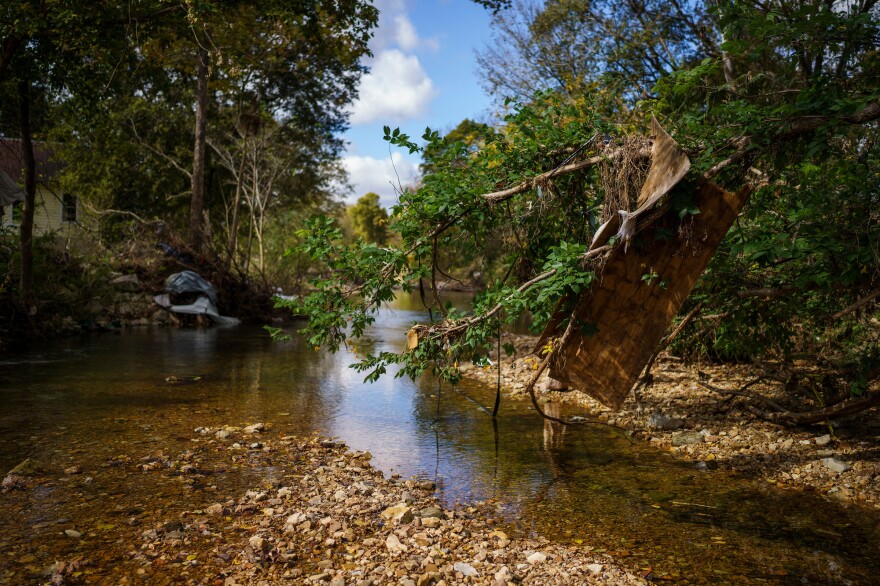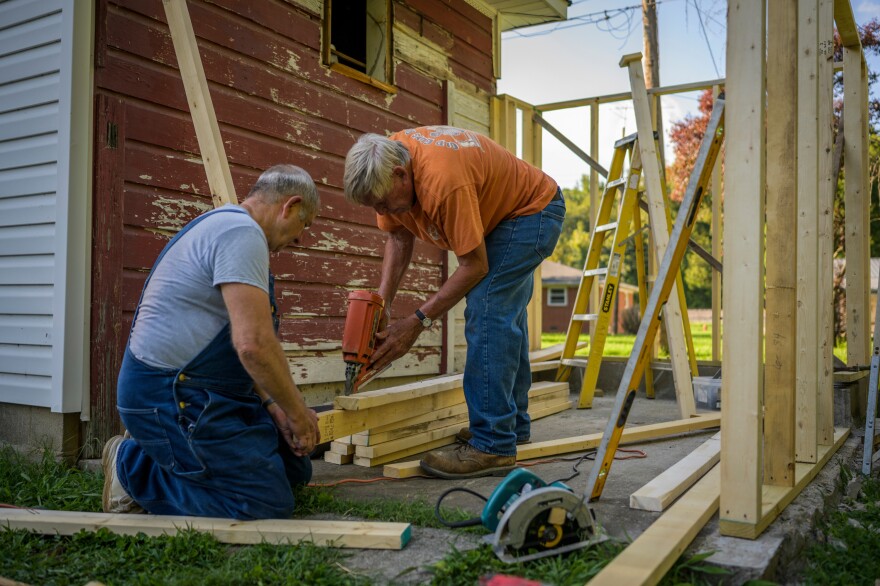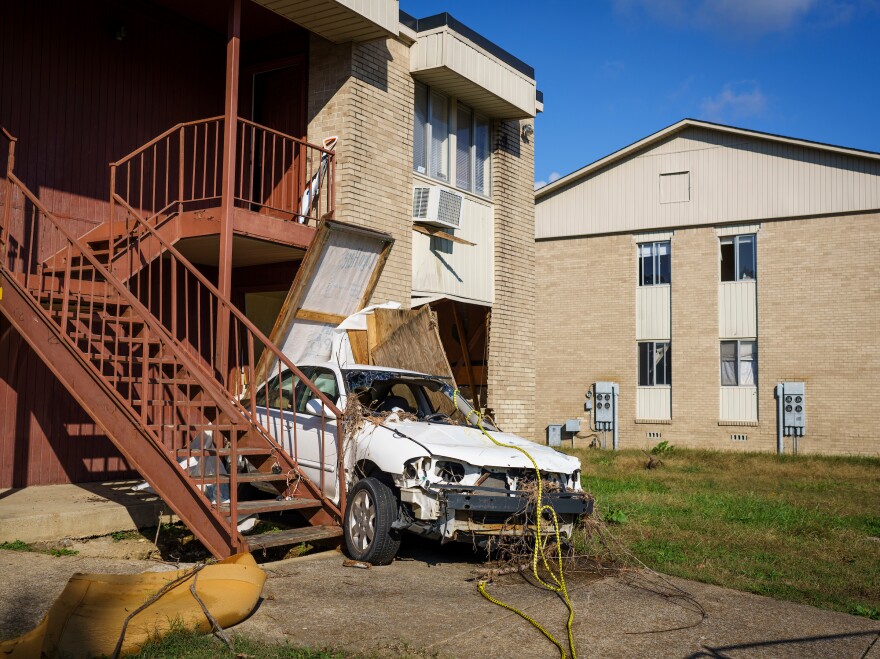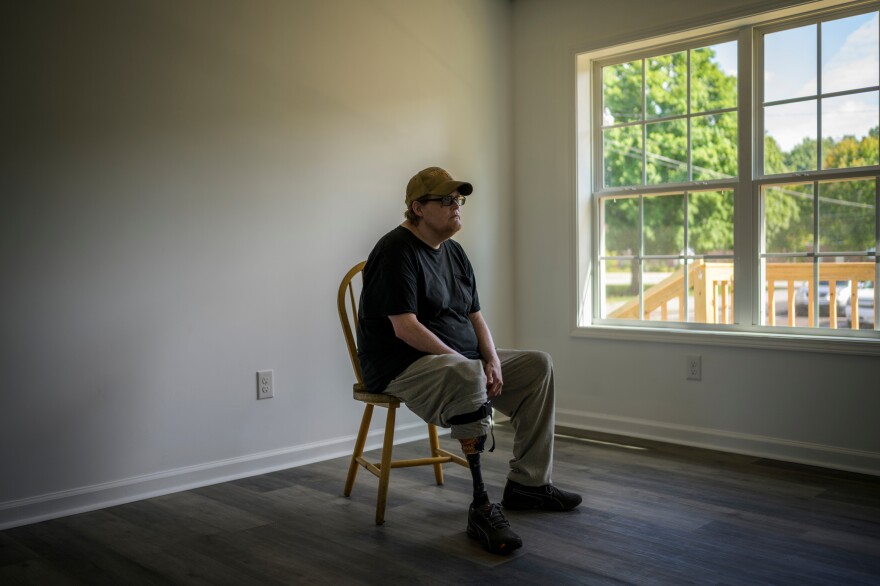A flash flood watch had been issued by the Nashville office of the National Weather Service the evening before. Meteorologists expected two to three inches of rain an hour, and almost no one was prepared.
That included the 4,000 or so people who lived in Waverly, a small town an hour and a half west of Nashville.
The rain began just before 1 a.m. on August 21, 2021. After sunrise, the water was so deep that it was forcing families from their homes and trapping others. In the course of a day, 21 inches of rain fell on Waverly and overflowed local creeks. The sound of helicopters filled the air while rescue boats cruised on top of the brown floodwaters below. The flood tore through Waverly and surrounding Humphreys County and killed 20 people.
Waverly is the largest city in the county. It was hit hard. There's been a lot of effort to rebuild. But many people are still a long way from a full recovery, and it's unclear if the community will ever be the same.

Building new memories
Some lifelong residents have left the town. The trauma was enough for longtimers, like Linda Balthrop, to count their losses and leave Waverly.
"It came fast," Balthrop says, "in a flash."
Balthrop, who's in her mid-70s, survived the flood with her husband. But in the year since, they've moved closer to their daughter and grandchildren in Mississippi.
"Coming back to Waverly and seeing it, I kind of admire the people that have stuck around," Balthrop says, "because it's really depressing here."

She and her husband had lived in their old home for nearly 50 years. But Balthrop is ready to put those memories behind her.
"If I were here, it wouldn't be as easy to do that because it's all around us, you know, all this destruction," Balthrop says. "But I think we're better off where we are now."
The house was the highest home in the neighborhood. It wasn't considered part of the floodplain, but the waters still reached it. It's since been remodeled by a family member.

Recounting the damage
Floodwaters damaged dozens of businesses and destroyed most of Waverly's public housing. Waverly Elementary School and Waverly Junior High School had to be abandoned.
Earlier this month, kids were supposed to start school in a remodeled boot factory, but there were construction delays. Renovation costs are expected to reach $11.7 million, with most of the bill covered by the Federal Emergency Management Agency (FEMA).
People harmed by the flood have received more than $7 million from FEMA. Millions of dollars have also been allocated to Waverly for road, bridge and other projects. Tennessee's statewide emergency management agency has also been working with federal leaders to map out possible flood mitigation projects.
Scientists say that extreme weather disasters are increasingly likely as climate change leads to heavier rainfalls. The U.S. Army Corps of Engineers and the U.S. Department of Agriculture have been conducting studies to prevent flooding from doing this kind of damage again.

"One of these studies will take 18 months," Waverly Mayor Buddy Frazier says. "So, you know, we've got to be patient while that's going on."
Frazier grew up in Waverly and used to be a local police officer. But the place he knew before the flood could be slipping away. Many people were displaced by the flood and haven't had the option to come back. One of those families were his tenants.
"They all survived. But then they had to relocate," Frazier says. "So we lost a good family. That's another one of the casualties, is what it is."

A lonely recovery
The displacements are expected to hurt sales and property tax revenues. But Waverly still has people who have made their way back.
"It's going to sound so cheesy. I always wanted to own a house, and I never thought I was going to be able to, because I've been disabled for a very long time," Gary Jackson says. "We were able to get this house, and I just couldn't bring myself to give it up."
Jackson has Type 1 diabetes, which caused him to lose a leg. He's been staying outside of Waverly and is now getting ready to move back. But the destruction is still hard to shake.

"Sometimes it's waking up in the middle of the night because you're having a bad dream," Jackson says. "Sometimes it's just not being able to sleep at all because you're just overthinking about what happened and what you could have done differently."
Jackson said his mind replays the moment his dog was sucked underneaththe raging water.
He moved to Waverly in 2017. His home is one of several rebuilt by Christian ministry group Appalachia Service Project. His new home represents the progress since the first days after the flood, when roads had washed away, and cars were stuck in trees.

Waverly has had a history of flooding. No one knows when another deadly flood could come through, or what long-term recovery will really look like. Pointing across his neighborhood, Jackson says he just hopes that things can get back to the way they were.
"That house is empty. They're all empty until you get to the other end of the street. And most of those are gone. Debbie's gone," Jackson says.
"And, I forget his name, he's gone right now" Jackson continues, "don't know if they're coming back or not, I haven't talked to them. But it's just lonely. It just looks lonely."
Copyright 2022 WPLN




